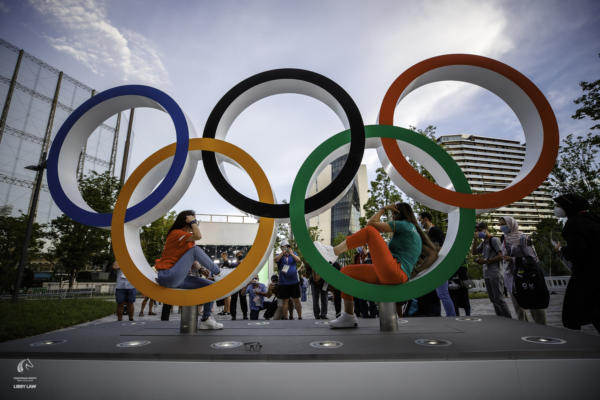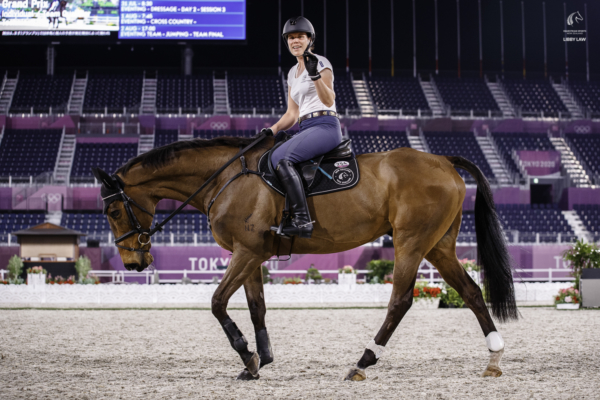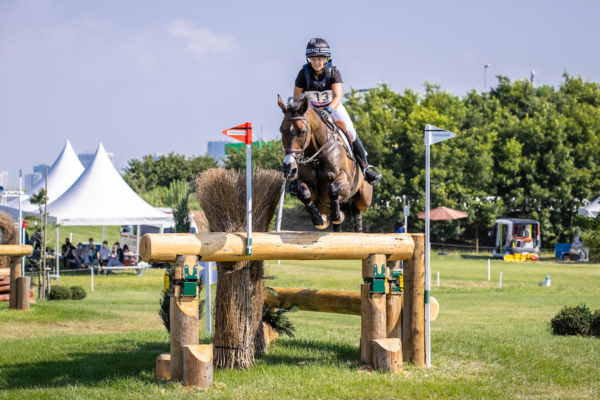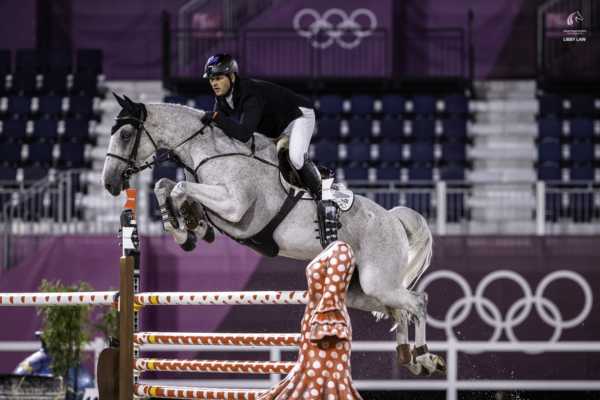
The Opening Ceremony at the Olympic Stadium. Tokyo 2020 Olympic Games. Friday 23 July 2021. Copyright Photo: Libby Law Photography
The Tokyo Olympic Games certainly delivered some superb horsemanship and exciting competition but still generated plenty of ongoing chatter around the new format.
Riders, trainers and spectators alike have had an opinion to share on the new format which saw just three combinations competing in the teams’ event, doing away with a fourth member and a drop score, while allowing the introduction of alternate combinations – which sometimes came with a penalty. It put a lot of pressure on combinations to just get home because without their scores, their team was out.
ESNZ high performance general manager Jock Paget says the format certainly generated plenty of conversation, which has been ongoing since the Games closed. His sympathies really did lie with the alternate riders and for New Zealand eventing, that was Bundy Philpott. “It really is tough on the alternate who has to come in each day of competition, not knowing if they are going to do anything or not and yet have to be prepared to go,” he said. “They are preparing for disappointment – it is a lose, lose situation.”

NZL-Bundy Philpott and Tresca NZPH. The New Zealand Equestrian Team – Eventing, do their evening familiarisations prior to competition at the Equestrian Park. Tokyo 2020 Olympic Games. Monday 26 July 2021. Copyright Photo: Libby Law Photography
He was full of praise for Bundy who had been “a great alternate”. “She was not only capable and ready to go each day but she dealt with the disappointment amazingly and it didn’t affect the team. It is an interesting dynamic that isn’t what the sport is meant to be about.”
The other side was a team member who had earnt their spot on the team but when they arrive at the Games, the horse perhaps needs a few days to look good but the management team gets nervous and subs them out. “It really does create a weird scenario. In eventing, it produces great sport when you have four in a team with three to count because it gives you the opportunity to take some risk. Everyone embraced it as much as they could and gave it a fair run.”
Things were quite different for the jumping where many teams did run all their four combinations thanks to the individual competition preceding the teams’ event. The Swedes dominated the jumping and were deserved winners of the team gold medal with the United States in silver and Belgium in bronze. Ben Maher (GBR) took the individual honours, Peder Fredricson (SWE) the silver and Maikel van der Vleuten (NED) bronze.
Jock says while there were lots of reasons the new format wasn’t a great idea in the jumping, the class produced a finale that was as good as he had ever seen. “It was just unbelievable!”
New Zealand’s eventing alternate Bundy Philpott said she didn’t think the new format felt at all fair to horse or rider. “Obviously it is a huge expense to each team and yet in eventing, using the alternate once you start is really in a ‘have no choice’ situation,” she said. “It means the team must ride as if they all must finish – no matter what nor considering the welfare of the horse – while the alternate must prepare as if they could sub in at any point.”
It was also tough on her experienced three day horse Tresca NZPH who was primed and ready to go with an expectation of competing. “You finish with a horse who has been through an entire prep and travelled, and yet not run but you almost have to treat them like they have as they have done 60% of the work and had to be ready each day to step in.”
She felt the system was cruel to teams, alternate riders and horses. “It was mentally exhausting and physically tough with nothing tangible to take out of it. I can understand more flags but shouldn’t the Olympics be the best of the best? Would the audiences have enjoyed seeing more top-end riders battle it out, irrelevant of country, or less capable riders scrape through with a different flag on the saddle cloth? Each nation has a sport that is a strength at the Olympics – like China and table tennis. Shouldn’t we focus on giving the best picture of any sport we possibly can?”
Bundy says to have run the alternates at Tokyo would have meant an extra 30 minutes to each dressage session, and 45 minutes to the cross country and jumping. “To have been and not run at all feels against every competitive part of my nature.”

NZL-Jonelle Price rides Grovine de Reve during the Eventing Cross Country Team and Individual. Tokyo 2020 Olympic Games. Sunday 1 August 2021. Copyright Photo: Libby Law Photography
But world no.7 Jonelle Price said she felt the new format worked in favour of New Zealand. “A drop score could have been advantageous for the other teams. The Brits could have fielded three teams but it gave them some breathing space but also meant we could stay in touch a bit more,” she said. “It brings the cross country into more emphasis and historically that has been a strong phase for the Kiwis. It certainly provided a good competition. It did change the way we looked at the cross country though – you just can’t afford a horse to make a random mistake like canter into the water and stumble or fall, so it made us look at it differently.”
At the coffin, for example, a fence late on the cross country, New Zealand decided as a team to take the long option, although Jonelle says personally she would have been happy to jump it. “But I think we played the right card.”
Tom Tarver was the alternate for the Kiwi jumping team but did get a start. “The best ones were very good and it was great sport with pressure,” he says. “At the end of the day, it is the Olympic Games, so the top teams coped with that pressure and delivered. I think it is tough for the horse because without a drop score a horse can be off form and you look at Ireland where one horse didn’t fire, and it meant the whole team was out.”
Tom says usually if your horse wasn’t going well, you would pull up and say ‘it’s not our day’. “But when you have to get a score, you have to finish and then you are basically being a bit hard on your horse if it actually doesn’t want to do it that day. For me, I would prefer where you take four and drop a score – from a horsemanship point of view, that is the better format.”

NZL-Tom Tarver rides Popeye during the Jumping Team Qualifier. Tokyo 2020 Olympic Games. Friday 6 August 2021. Copyright Photo: Libby Law Photography
The drive for the new format came out of the International Olympic Committee’s Olympic Agenda 2020, was to create sport that was more universal, more exciting, easier to understand and more attractive, particularly for new young audiences.
The FEI say the new Olympic formats were approved by national federations at the FEI General Assembly in Tokyo in 2016. Just 11 – Albania, Bulgaria, France, Germany, Latvia, Luxembourg, Monaco, New Zealand, The Netherlands, Romania and Switzerland – out of the 107 federations represented voted against the proposal.
The FEI considers the new formats used at the Tokyo Games a hit. “The Tokyo 2020 Olympic Games were very successful, with great champions in all three disciplines,” said a spokesperson. “As already agreed a long time ago, we will do a thorough debrief to evaluate the formats and see what can be improved.” The Tokyo format came after a thorough consultation process with member national federations and stakeholders, including athletes.
However, since the Games a number of top showjumpers have been critical of the format, saying it was particularly hard on the horses.
The new formats were created for the Olympic Games only, and not World Equestrian Games, however, the FEI have said any discussion about changing that would mean a full consultation process with national federations and stakeholders.
By Diana Dobson – HP Media Liaison